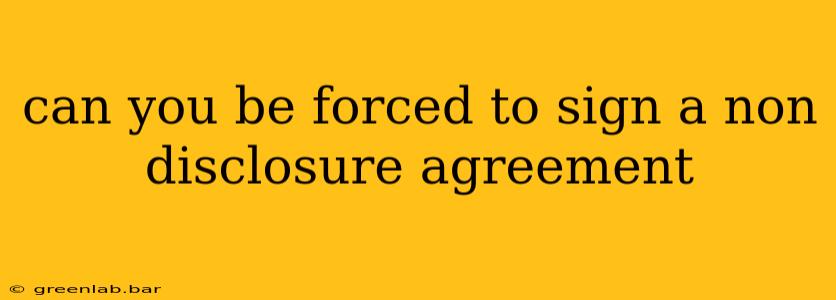Can You Be Forced to Sign a Non-Disclosure Agreement (NDA)?
The short answer is: no, you cannot be forced to sign a non-disclosure agreement. However, the circumstances surrounding the request significantly impact the potential consequences of refusing. Understanding the nuances is crucial.
While you possess the right to refuse signing an NDA, the ramifications of your decision depend heavily on the context. Let's explore various scenarios:
Situations Where Refusal is Relatively Low-Risk:
-
Casual Conversations: If a friend or acquaintance asks you to sign an NDA regarding an informal conversation, you are generally free to refuse without significant repercussions. There's usually no legal basis for enforcing such an agreement.
-
Unfavorable Terms: NDAs can contain overly broad or unreasonable clauses. You are not obligated to agree to terms you find unfair or unduly restrictive. Refusal in this case is perfectly acceptable. Seek legal counsel to review questionable terms before signing any agreement.
-
Lack of Consideration: A valid contract requires "consideration"—something of value exchanged between parties. If the NDA offers nothing in return for your confidentiality, it lacks consideration and may not be legally enforceable.
Situations Where Refusal Carries Higher Stakes:
-
Employment Contracts: Many employment contracts include confidentiality clauses. Refusing to sign might jeopardize your job offer or even lead to termination if you are already employed. The employer may have legitimate interests in protecting its trade secrets and intellectual property.
-
Business Partnerships: In a business partnership, an NDA is a common safeguard. Refusal might severely damage the relationship and potentially prevent the partnership from forming or continuing.
-
Negotiations and Deal Making: During negotiations for a significant deal (e.g., a merger, acquisition, or licensing agreement), NDAs are standard practice. Refusal here could be a deal-breaker, as both parties need to be confident in the confidentiality of shared information.
-
Confidential Information Disclosure: If you've already received confidential information and are then asked to sign an NDA, refusing might expose you to legal action for breach of confidence, even without a formally signed agreement. This hinges on the nature of the information and its disclosure.
Key Considerations:
-
Legal Counsel: Always consult with an attorney before signing any NDA, especially those related to employment, business ventures, or significant transactions. A lawyer can help you understand the terms and ensure your rights are protected.
-
Negotiation: You might be able to negotiate certain terms of the NDA to make it more favorable to you.
-
Consequences: Carefully weigh the potential consequences of refusing to sign against the potential benefits. The decision should be strategic and informed.
In conclusion: While you cannot be legally compelled to sign an NDA against your will, the ramifications of refusal can vary significantly depending on the circumstances. Understanding the potential implications and seeking legal advice when necessary is crucial to making an informed decision. The best course of action is always to carefully review the agreement and seek professional guidance before committing.

